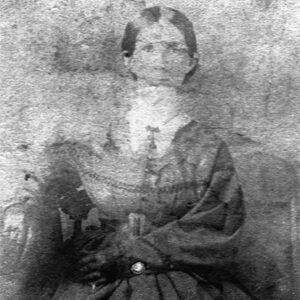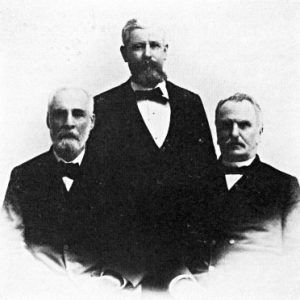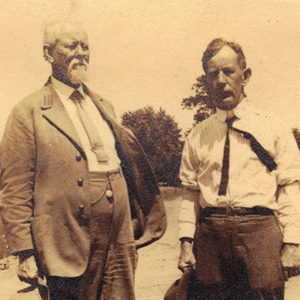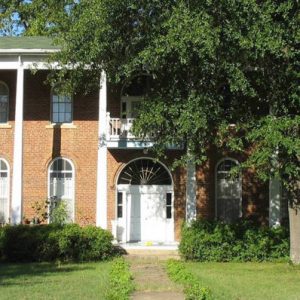calsfoundation@cals.org
Arch McKennon (1841–1920)
aka: Archibald Smith McKennon
Archibald Smith McKennon was a Confederate military officer, storekeeper, lawyer, temperance advocate, and political activist in Arkansas in the latter part of the nineteenth century. These activities led to an appointment to the Commission to the Five Civilized Tribes, commonly known as the Dawes Commission. This committee negotiated land allotments to individual Native Americans in order to lessen tribal claims. This subsequently opened the area to white settlement in—and facilitated statehood for—the Oklahoma Territory.
Arch McKennon was born near Pulaski, Tennessee, on February 7, 1841. He was one of several children of Dr. Archibald McKennon and Sarah Smith McKennon, who had moved there from South Carolina. The family later immigrated to Arkansas and made their home in Carroll County in 1853. On September 15, 1861, McKennon married Virginia Arkansas Berry, sister of James H. Berry, a U.S. senator and Arkansas’s fourteenth governor.
McKennon enlisted in the Confederate army as a first lieutenant at Carrollton (Carroll County) on October 19, 1861. He served in Company K of the Fourth and Company E of the Sixteenth Arkansas infantry regiments. Captured at Port Hudson, Louisiana, on July 9, 1863, McKennon was imprisoned at Johnson’s Island, Ohio, and Point Lookout, Maryland. After a transfer to Fort Delaware, he was released in June 1865.
McKennon returned to Carroll County after the Civil War. He and Virginia had four children, and in 1867, they moved to Clarksville (Johnson County), where she died in 1874. McKennon married Hannah Basham of Clarksville in 1876, and they had ten children.
In Clarksville, McKennon and his business partner, Lorenzo N. Swaggerty, operated a general store and built matching brick homes. McKennon became a lawyer and served in the state Senate from 1878 to 1879. He was prosecuting attorney for the Fifth Judicial District from 1878 to 1882 and, during this tenure, was involved in a scandalous courtroom altercation with Judge George S. Cunningham in Clarksville. McKennon inflicted several knife wounds upon the judge; he was indicted and pleaded guilty. He was later fined and served a token prison sentence, but he remained a successful attorney.
While making the law his profession, McKennon participated in many civic activities. In the early 1870s, he joined other prominent Clarksville citizens to prevent the removal of the Johnson County seat from Clarksville to Spadra (Johnson County). He took part in the effort to locate Arkansas Cumberland College (now the University of the Ozarks) in Clarksville and also raised money for the school. McKennon served on the board of trustees of the Methodist church in Clarksville and also Hendrix College in Conway (Faulkner County). He supported temperance movements in Johnson County and served as president of the Prohibition State Alliance in 1891.
A staunch Democrat, McKennon campaigned for Grover Cleveland in the 1892 presidential election. President Cleveland subsequently appointed McKennon as an original member of the Commission to the Five Civilized Tribes in 1893. To fulfill his duties on the Dawes Commission, McKennon moved his family and his law practice to McAlester, Oklahoma. While serving on the commission, he campaigned vigorously against the distribution of alcoholic beverages in the territory, supporting the admission of Oklahoma as a state only under the condition of perpetual prohibition.
McKennon died on September 20, 1920, in McAlester and is buried in Oakland Cemetery in Clarksville.
For additional information:
Brown, Loren N. “The Dawes Commission.” Chronicles of Oklahoma 9 (March 1931): 76–77.
“Fight in the Courtroom.” Arkansas Gazette. May 19, 1888, p. 1.
“In the Interest of Temperance.” Arkansas Gazette. July 16, 1892, p. 1.
Langford, Ella M. History of Johnson County. Clarksville, AR: Johnson County Historical Society, 1981.
Obituary of Capt. A. S. M’Kennon. Arkansas Gazette. September 23, 1920, p. 8.
Obituary of Capt. A. S. McKennon. Clarksville Herald-Democrat. September 23, 1920, p. 3.
Brenda J. Murray
Russellville, Arkansas
 Virginia Berry
Virginia Berry  Arch McKennon
Arch McKennon  Arch McKennon and Son
Arch McKennon and Son  Arch McKennon Home
Arch McKennon Home 




Comments
No comments on this entry yet.